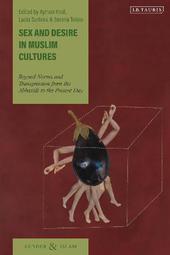
|
Sex and Desire in Muslim Cultures: Beyond Norms and Transgression from the Abbasids to the Present Day
Hardback
Main Details
| Title |
Sex and Desire in Muslim Cultures: Beyond Norms and Transgression from the Abbasids to the Present Day
|
| Authors and Contributors |
Edited by Professor Aymon Kreil
|
|
Edited by Dr Lucia Sorbera
|
|
Edited by Professor Serena Tolino
|
| Series | Gender and Islam |
|---|
| Physical Properties |
| Format:Hardback | | Pages:264 | | Dimensions(mm): Height 234,Width 156 |
|
| ISBN/Barcode |
9781838604080
|
| Classifications | Dewey:306.7091767 |
|---|
| Audience | | Professional & Vocational | |
|---|
|
Publishing Details |
| Publisher |
Bloomsbury Publishing PLC
|
| Imprint |
Bloomsbury Publishing PLC
|
| Publication Date |
24 December 2020 |
| Publication Country |
United Kingdom
|
Description
What have different ideas about sex and gender meant for people throughout the history of the Middle East and North Africa? This book traces sex and desire in Muslim cultures through a collection of chapters that span the 9th to 21st centuries. Looking at spaces and periods where sexual norms and the categories underpinning them emerge out of multiple subjectivities, the book shows how people constantly negotiate the formulation of norms, their boundaries and their subversion. It demonstrates that the cultural and political meanings of sexualities in Muslim cultures - as elsewhere - emerge from very specific social and historical contexts. The first part of the book examines how people constructed, discussed and challenged sexual norms from the Abbasid to the Ottoman period. The second part looks at literary and cinematic Arab cultural production as a site for the construction and transgression of gender norms. The third part builds on feminist historiography and social anthropology to question simplistic dichotomies and binaries. Each of the contributions shows how understanding of sexualities and the subjectivities that evolve from them are rooted in the mutually-constitutive relationships between gender and political power. In identifying the plurality of discourses on desires, the book goes beyond the dichotomy of norm and transgression to glimpse what different sexual norms have meant at different times across the Middle East.
Author Biography
Aymon Kreil is Assistant Professor for the Anthropology of the Middle East at Ghent University, Belgium. He worked before at the Institute of Asian and Oriental Studies at the University of Zurich, Switzerland. Lucia Sorbera isChair of the Department of Arabic Language and Cultures at the University of Sydney, Australia. Serena Tolino is Associate Professor in Islamic/Middle Eastern Studies at the University of Bern, Switzerland. Previously she was a postdoctoral researcher at the University of Zurich, Switzerland.
ReviewsThis far-reaching collection offers a surprising array of sources, from early Ottoman erotic poetry to 1970s gay Egyptian cinema, and it informs us about a wide range of Muslim lives from crossdressing slaves in Abbasid Baghdad to female sex workers in modern Tangier. Yet it also does much more. The authors assembled here challenge us to rethink the categories by which we understand sex and desire, whether it is to test the comparability of modern notions of gender binaries against premodern texts or to chart the silencing of erotic discussions in nineteenth-century Arab writings. They resist easy answers to ideas about subversion in women's novels in Baathist Iraq or reconciling Islam and queerness among modern Palestinians. Along the way, they craft indelible images: love of hashish and boys in Sufi communities, student feminists in 1970s Egypt, and closeted gay men in modern Lebanon. A rewarding read for novices and experts in the field alike. * Mathew Kuefler, Professor of History, San Diego State University, USA * A wonderfully rich and varied interdisciplinary collection, including both historical and contemporary perspectives, that provides us with a "glimpse of desire" by highlighting the plurality of meaning and practices linked to gender and sexuality in the Middle East. -- Nadje Al-Ali, Professor of Anthropology & Middle East Studies, Brown University, USA
|